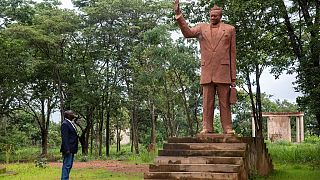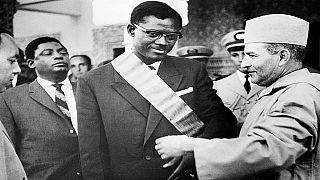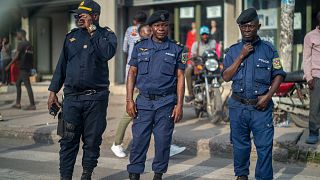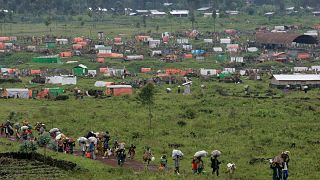Democratic Republic Of Congo
Sixty years after Congolese independence leader Patrice Lumumba was assassinated and dissolved in acid, former colonial power Belgium is to restore his last remains -- a single tooth -- to his family.
Former colonial ruler Belgium held onto Lumumba's tooth- thought to be his last remains, which a Flemish police officer held onto.
"For us, it is not a tooth. For us, the Bantu, when someone dies far from home, and we can't bring him back, we bring at least a bit of his hair and his nails and bury them at home," said Roland Lumumba, son of slain Congolese independence leader Patrice Lumumba.
So for us, it's his remains and it means a lot to us."
The handover ceremony will launch a period of official mourning, during which both countries will look back on their troubled past and the Democratic Republic of Congo will lay to rest a national hero.
**'Asking for justice' **
"We are not asking for an apology, we are asking for justice. We ask that justice be done," said Christophe Marchand, Lumumba family lawyer.
"We ask, like any family of a murder victim, that justice be done, that the investigation be carried out, that the culprits be punished and that there be reparation."
A solitary statue marks the spot where Lumumba was executed in Katanga province.
He is now known to have been killed on January 17, 1961, by separatists and Belgian mercenaries after the declaration of independence.
Perceived in Washington and Brussels as a potential friend of the Soviet Union, the young republic's first prime minister was seen as a victim of Cold War rivalries.
After he was shot his body was dissolved in acid, but Belgium has now recovered a tooth that was apparently kept as a souvenir by a Flemish police commissioner who took part in the disposal of the remains.
He was killed after Belgium backed the Katanga revolt in a Cold War manoeuvre and his young sons -- then ten and three years old -- were exiled for a while in Egypt, which under President Gamal Abdel Nasser was a non-aligned power.
'The Belgians planned Lumumba's death'
The history of Belgium's involvement in Congo before and after independence has remained controversial, but a 2000-2001 parliamentary inquiry concluded that the country bore "moral responsibility" for Lumumba's assassination.
This "relic" will now be returned to the family and laid to rest after a series of "national funerals" in his homeland.
"Up until now people have presented it as if it was the Congolese who killed their Congolese brother," said historian Guillaume Nkongolo.
"To be precise, they said it was the people of Katanga who killed their Congolese brother. But the truth came from the archives in the end: the Belgians planned Lumumba's death and had him executed."
In 2002, the Belgian government apologised to the country and for the past ten years, there has been an active judicial investigation for an alleged "war crime" based on a complaint from elder son Francois.
Ceremonies are expected to take place on June 21 and 22 in Brussels.
The brothers plan the first event to receive the remains from Belgian officials, then the next day an official Congolese ceremony, probably attended by the current President Felix Tshisekedi.
The family also hopes to be able to display a coffin draped in the Congolese flag in public in Brussels for the Congolese and broader African communities to pay their respects before the return.
Tshisekedi has said he is planning a mausoleum in the DRC capital for Lumumba, who served as prime minister of the then Republic of the Congo between independence in June 1960 and September.












01:01
Trial of DRC's former Justice Minister Constant Mutamba postponed for two weeks
01:11
Legal complaint targets family of DRC's Félix Tshisekedi for looting
00:55
The Democratic Republic of Congo celebrates the centenary of Patrice Lumumba's birth
01:52
In Goma, solar power brings light and hope in Ndosho neighbourhood
00:08
Vatican beatifies Congolese customs worker killed in 2007 for refusing bribe
01:49
UN warns of impact Sudan's humanitarian crisis is having on Chad